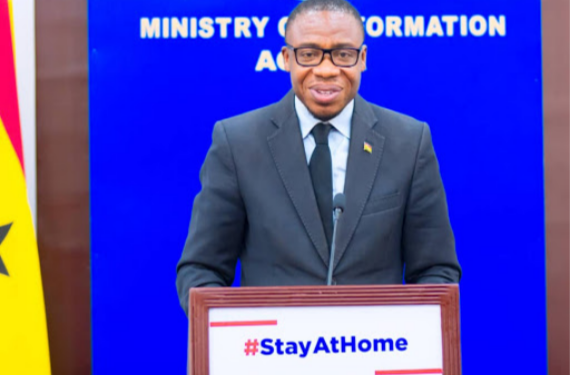The Director of Health Promotion at the Ghana Health Service (GHS), Dr DaCosta Aboagye has encouraged the public not to fret over safety issues concerning vaccines for the coronavirus disease (COVID-19), as the government is committed to ensuring that all the vaccines it is acquiring will be safe for use locally.
Additionally, the Health Promotion Unit would make public all the necessary information on the vaccines and the vaccination exercise ahead of administration.
Speaking to the Daily Graphic in Accra yesterday, Dr Aboagye said there was no room for uncertainties because all the necessary safety and efficient arrangements had been instituted to ensure that only vaccines that had been tested in manufacturing jurisdictions and approved by national, global and regional vaccine testing and approving bodies were used on the Ghanaian population.
He mentioned such bodies to include the Food and Drugs Authority (FDA), the Ghana Standards Authority (GSA), the World Health Organisation (WHO) and the West African Health Organisation (WAHO).
He emphasised that in the interest of public health, the government was working around the clock to ensure that the people were not deprived of any globally approved and accepted vaccines.
Misconception
Dr Aboagye, who is also the Leader of Risk Communication and Community Engagement for Ghana’s COVID-19 Response, responding to misinformation and myths about the vaccines, said Ghana had capable institutions to make sure it received only safe doses of vaccines.
“When you get such a vaccine, we have rules and laws in this country and so we will route it through the FDA to make sure that the safety and its efficacy are guaranteed,” he said.
He said the FDA, together with the GSA and the Ghana Pharmaceutical Council, had, in the past, approved a lot of safe vaccines and would have the capacity to do same with COVID-19 vaccines.
“There are so many misconceptions about the vaccines, with people saying they cause genetic mutation and affect one’s sperms, while others say it is the mark of 666. Let me say that as it stands now, those are myths; they are not true,” he said.
Public Education
He added that his outfit, together with the Ministry of Information and the NCCE, would intensify education and public sensitisation to address the myths, misconceptions and misinformation.
Using what he called the “above-the-line method”, where media partners are used to engage the public, and “below-the-line method”, which involves community engagements, Dr Aboagye was optimistic that Ghanaians would eventually embrace the COVID-19 vaccines.
“We at the Health Promotion Unit of the GHS will also ensure that the public is not denied any information it needs about the vaccine and the vaccination exercise,” he said.
Dr. Aboagye said the GHS, the Ministry of Information, and the NCCE would conduct a national educational campaign to properly inform Ghanaians about the safety of vaccines soon.
He said the plan was far advanced and no Ghanaian would be left behind in the COVID-19 vaccination education.
COVAX
In a related development, the Director of Public Health at the GHS, Dr. Franklin Asiedu Bekoe, has said as part of preparations towards acquiring the vaccines, the country has made a request to the pooling organization, the COVID-19 Vaccines Global Access (COVAX) Facility, for COVID-19 vaccines.
The facility is a global initiative to help countries have the opportunity to benefit from a portfolio of vaccine candidates so that their populations can have early access to effective vaccines.
It brings together governments and manufacturers to ensure that eventually approved COVID-19 vaccines reach those in greatest need, whoever they are and wherever they live.
For governments that do not have bilateral agreements, the COVAX Facility offers a reliable supply of safe and efficacious vaccines.
“We’re not going to get all at once; it will come and continue coming. But, hopefully, let’s say by the end of the first quarter of 2021, we will start getting the vaccines,” Dr. Bekoe said.
“What the COVAX facility does is that it gives countries vaccines to a tune of about 20 percent of their population. For a country such as Ghana, it means that the facility will get us up to about six million,” he said.
Background
When the COVID-19 hit the world, health experts indicated that there was no vaccine or medication for the disease.
As a result, preventive measures hinged on a number of preventive protocols, such as hand and respiratory hygiene, wearing of face masks, and social distancing.
However, the efforts of some global scientists and pharmaceutical companies to develop vaccines have yielded good results.
President Nana Addo Dankwa Akufo-Addo, in his 23rd national address on the subject since Ghana recorded its first two cases in March 2020, assured the citizenry that the government was working to procure 17 million doses of COVID-19 vaccines by the end of June 2021.
According to him, only vaccines evaluated and declared safe would be procured and administered.
“The earliest vaccine will be in the country by March. The FDA will use its established processes for granting emergency use authorization for each vaccine in Ghana. As President of the Republic, I assure you that only vaccines that have been evaluated and declared safe for use in Ghana will be administered,” the President said.
Source: www.graphic.com.gh

